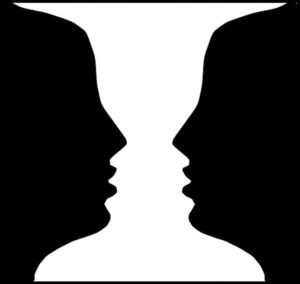
PRATĪTYASAMUTPĀDA (or pratītya-samutpāda) – ‘dependent origination’, ‘interbeing’
[Sariputta:] “Now this has been said by Him: ‘One who sees conditioned arising sees the Dhamma; and one who sees the Dhamma, sees conditioned arising.’”
“Let be the past, Udayin, let be the future. I shall teach you the Dhamma: when this exists, that comes to be; with the arising of this, that arises. When this does not exist, that does not come to be; with the cessation of this, that ceases.” (Extracts from the Pali Canon – translated by Stephen Batchelor – available on his website)
Pratītyasamutpāda is a term which has no obvious counterpart in English – hence the awkward translations: dependent-origination, interbeing, dependent co-arising, co-dependence, conditioned-arising, etc. The word, in Sanskrit, comes from: pratītya – ‘meeting, relying, depending’; and, samutpa – ‘arising’. It denotes the way in which everything in the universe is dependent upon everything else. All things exist in the way that they do because everything else exists in the way that it is. Things are as they are, because other things are as they are. Change one entity and all entities are changed – however minutely. Pratītyasamutpāda implies both causality, one thing leading to another, and interdependence or interconnection.
A chair is its own history bound up in its present; it is the coming together of all the forces, actions ideas and materials that went into its making and into the making of its materials (wood, metal, fabric, etc). A chair is also a space in everything it is not! The surface of the chair, is also the surface of the air that surrounds it. The chair and the space (and time) around it are dependent on each other – they arise together.
There is also the sense that, if nothing is ever fixed because everything is always subject to change, growth, decay, impermanence, then nothing can be independent or separate from everything else. There are no fixed boundaries between one ‘thing’ and another, indeed, in reality there are no ‘things’ only events, processes, the transient arising and dissolving of forms. The universe is conditional and relational. It is a deeply ecological view of existence as a mutually dependent whole.
And these properties of interdependence, interaction and causality apply equally to the realm of human psychology and culture. We are what we are because everything else is what it is. Any action has an effect that ripples out in all directions. Likewise with any thought or feeling. We are the constantly changing manifestation of all the currents of history (causality) that flow within, through and around us. There is no part of us, or any other being, that isn’t interwoven with everything else. ‘We’ only make sense in relation to our own history and upbringing, and to all the chains of cause and effect that make up who we are – all the people we have interacted with (directly and indirectly), our cultural context, our physical make-up, and so on.
As Thich Nhat Hanh (and others) put it:
“This is, because that is. This is not, because that is not. This ceases to be, because that ceases to be.”
On another level pratītyasamutpāda means something that is, perhaps, more difficult to accept: if we awaken to the present moment, if we accept that reality is as it is NOW – that there is no past or future – then we and the whole universe arise together at every moment. At every moment of consciousness we and the universe are freshly minted!
Zhuang Zhou (or Chuang-tzu – a Daoist teacher): “Heaven and earth were born together with me, the myriad things and I arise as one.”
form is emptiness – emptiness is form
